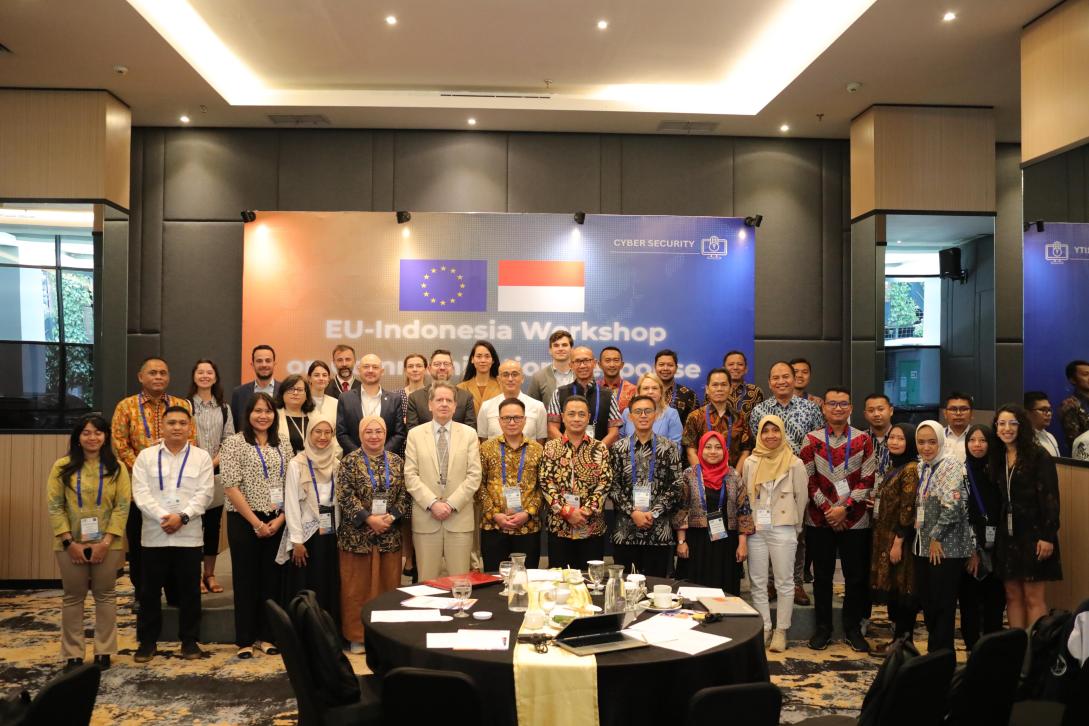EU and Indonesia discuss communication response to cybersecurity incidents

Effective communication key to building cyber resilience: EU & Indonesia discuss communication response to cybersecurity incidents
-
Over two days, participants from Indonesia and the EU explored key aspects of cybersecurity communication, including stakeholder coordination, application of crisis communication protocols, and public information management strategies.
-
The dialogue deepened EU–Indonesia collaboration on cyber governance, crisis response and digital transformation.
Bandung, Indonesia, 29 April 2025: Some 30 officials and cybersecurity experts from the European Union (EU), EU Member States and Indonesian government agencies took part in a workshop on communication response to cybersecurity incidents.
Over two days, participants explored key aspects of communication during cyber incidents with a view to maintaining public trust, enhancing stakeholder coordination, and ensuring transparency and accountability.
The dialogue was co-organised by the EU Delegation to Indonesia and the Indonesia’s National Cyber and Crypto Agency Badan Siber dan Sandi Negara (BSSN), with the support of the EU project Enhancing Security Cooperation In and With Asia and the Indo-Pacific (ESIWA+).
Indonesian participants hailed from the Coordinating Ministry for Political and Security Affairs, the Ministry of Foreign Affairs, the Ministry of Communication and Digital Affairs, the Ministry of Defence and PT Len Industri (Persero). EU Member States such as Finland, France, Hungary and the Netherlands were represented in true “Team Europe” fashion.
Lieutenant General (Ret.) Drs. Nugroho Sulistyo Budi, M.M., M.Han, Head of BSSN, said: “Building digital trust forms the foundation for long-term cyber resilience. Effective communication is not only about speed but also about clarity, transparency, trust, and empathy. This workshop is not merely a technical training, but a vital step in reinforcing our communication capacity to manage cybersecurity crises.”
“No country is immune to cyber threats, and no institution can face them alone. This event reflects our shared commitment to strengthening international collaboration in addressing the increasingly complex challenges of cybersecurity,” he added.
Addressing the event, H.E. Denis Chaibi, the EU Ambassador to Indonesia, pointed out that cyber threats were not limited to technical attacks. “Increasingly, we face hybrid challenges, including the spread of disinformation and manipulation of public opinion. In our Cybersecurity Strategy for the Digital Decade, the EU sets out its ambition to work with international partners, especially in the Indo-Pacific, to build a shared and secure digital future. In this context, the EU–Indonesia partnership has become increasingly important, and we continue deepening our collaboration on cyber governance, crisis response, and digital transformation.”
Participants at the workshop learned about the fundamental principles of crisis communication, how to build situational awareness, and how to prepare communication responses during the initial phase of a simulated cyber crisis. The participants were tasked with formulating strategic responses from both a technical cybersecurity perspective and a public communication perspective.
Indonesia has enacted Presidential Regulation Number 47 of 2023 on the National Cybersecurity Strategy and Cyber Crisis Management. This regulation emphasises the need to enhance national preparedness for cyber incidents, strengthen a coordinated cyber crisis management system, and deliver timely, accurate, and transparent information to all stakeholders, including the public.
The EU has developed tools to counter hybrid threats, including strategic communication teams and partnerships with social media platforms, and has established initiatives such as the EU Hybrid Toolbox, EU Cyber Diplomacy efforts, and the EUCyberNet global network.

ESIWA
About the EU’s ESIWA project:
ESIWA+ (Enhancing the EU’s Security Cooperation In and With Asia and the Indo-Pacific) works to enhance cooperation in four thematic areas: counterterrorism and preventing violent extremism, crisis management/addressing hybrid threats, cyber security, and maritime security. ESIWA+ is co-funded by the European Commission’s Service for Foreign Policy Instruments, the German Federal Foreign Office, and the French Ministry for Europe and Foreign Affairs. ESIWA+ is co-implemented by the German Corporation for International Cooperation (GIZ), and by Expertise France.
Previous ESIWA activities in Indonesia:
In cyber security, EU and Indonesia in June 2021 hosted an online webinar on confidence building measures in cyberspace. In October 2022, ESIWA and the Ministry of Foreign Affairs of Czechia in partnership with BSSN implemented a seminar examining how to deter and respond to cybercrime. In June 2024, ESIWA organised a workshop on the EU-Indonesia strategy on advancing implementation of the UN framework on responsible state behaviour.
Previous ESIWA activities in Indonesia have covered the regulation of unmanned underwater vehicles, standard minimum rules for the treatment of children, anti-money laundering & countering terrorism financing, crisis management, connecting women working in counterterrorism law enforcement, Common Security and Defence Policy (CSDP) handbook book tours, support to the development of Indonesia's Knowledge Hub on Countering Terrorism and Violent Extremism (#IKHub), and the repatriation of children from displacement camps of North-East Syria.
CONTACT DETAILS
Rahul VENKIT
Communications & Visibility Expert, ESIWA+
rahul.venkit@expertisefrance.fr
